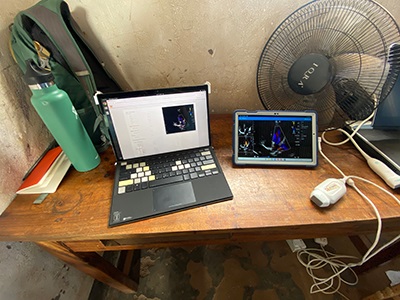Portable AI Technology As Accurate As Cardiologists in Detecting Rheumatic Heart Disease
Posted on 24 Jan 2024
Rheumatic heart disease (RHD), a result of the body's response to repeated Strep A bacterial infections, can lead to permanent heart damage. Early detection is crucial, as RHD is treatable with penicillin, a commonly available antibiotic. However, millions in low-income countries lack access to specialized care, and the standard method for RHD diagnosis requires a skilled cardiologist to interpret an echocardiogram—a widely used, non-invasive ultrasound imaging technology. The absence of a cardiologist often results in undetected RHD, leading to severe cardiac complications and even death. As a result, while almost eradicated in high-income countries, while RHD has been almost entirely eradicated in high-income nations, it still impacts the lives of 40 million people in low- and middle-income countries, causing nearly 400,000 deaths annually.
In new research, scientists at Children’s National Hospital (Washington, D.C., USA) have shown that artificial intelligence (AI) can detect RHD with equivalent accuracy to a cardiologist. This breakthrough in applying advanced deep learning technology to RHD, a disease of inequity, could help prevent hundreds of thousands of deaths globally each year. The innovative AI system combines advanced ultrasound probes with portable electronic devices equipped with algorithms that diagnose RHD from echocardiograms. Distributing these devices could enable healthcare workers, even without specialized medical training, to identify RHD in regions where it is still prevalent.

The AI system was developed through extensive testing of machine learning modalities, which emulate human intelligence, and deep learning, which surpasses human learning capabilities. This dual-approach optimization led to a novel algorithm trained to interpret ultrasound images for RHD detection. The AI algorithm has already identified 39 heart characteristics associated with RHD that are imperceptible to cardiologists with the naked eye. For instance, heart size is crucial in RHD diagnosis, with current guidelines using two weight categories—above or below 66 pounds—as indirect measures. However, heart size in children within these groups can vary significantly.
The research team faced the challenge of training the AI to manage clinical variations in ultrasound images and the intricacies of analyzing color Doppler echocardiograms, typically requiring specialized human skills. In trials, the AI algorithm successfully identified mitral regurgitation, a common RHD indicator, in up to 90% of affected children. This condition leads to improper closure of mitral valve flaps, causing reverse blood flow. A pilot program in Uganda will integrate AI into the echo screening process for children at risk of RHD. The researchers believe that a handheld ultrasound probe, a tablet, and a laptop equipped with this sophisticated algorithm could significantly improve early diagnosis and alter outcomes for these children.
“This technology has the potential to extend the reach of a cardiologist to anywhere in the world,” said Kelsey Brown, M.D., a cardiology fellow at Children’s National Hospital. “In one minute, anyone trained to use our system can screen a child to find out if their heart is demonstrating signs of RHD. This will lead them to more specialized care and a simple antibiotic to prevent this degenerative disease from critically damaging their hearts.”
“One of the most effective ways to prevent rheumatic heart disease is to find the patients that are affected in the very early stages, give them monthly penicillin for pennies a day and prevent them from becoming one of the 400,000 people a year who die from this disease,” added Craig Sable, M.D., interim division chief of Cardiology at Children’s National Hospital. “Once this technology is built and distributed at a scale to address the need, we are optimistic that it holds great promise to bring highly accurate care to economically disadvantaged countries and help eradicate RHD around the world.”
Related Links:
Children’s National Hospital














